微服務系列-基於Spring Cloud Eureka進行服務的註冊與消費
公眾號「架構成長指南」,專注於生產實踐、雲原生、分散式系統、巨量資料技術分享。
在之前的幾個教學中,我們學了:
使用 RestTemplate 的 Spring Boot 微服務通訊範例
使用 WebClient 的 Spring Boot 微服務通訊範例
使用 Spring Cloud Open Feign 的 Spring Boot 微服務通訊範例
在本教學中,我們將學習如何在Spring boot微服務專案中使用Spring Cloud Eureka進行服務註冊與消費
服務註冊和發現概述
在微服務專案中,我們一般會對一個專案,以業務的維度拆分至多個服務,比如使用者服務、賬務服務、訂單服務、倉儲服務等,這些服務在生產環境部署,
至少是2個服務範例,如果業務量大幾十個都是有可能的。
試想這樣一種場景
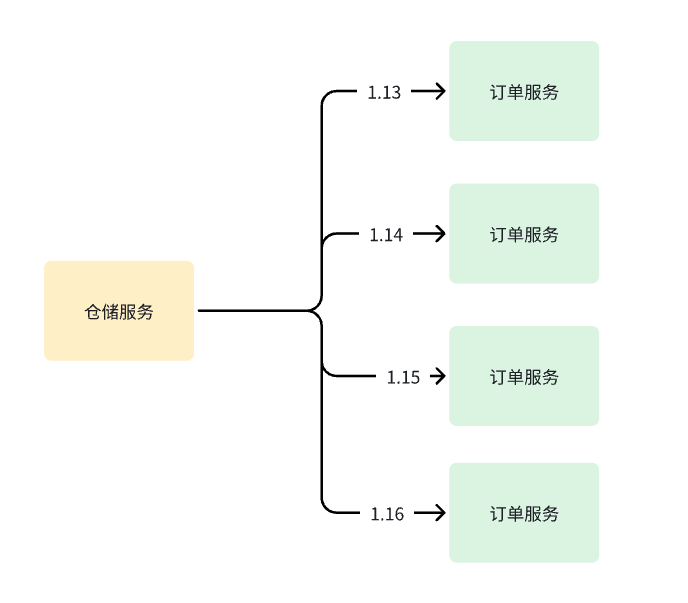
訂單服務範例部署了4個,倉庫服務部署了5個,倉庫服務要呼叫訂單服務,如果沒有註冊中心,他會怎麼做,那只有把對應的ip和埠寫死在程式碼中,如果新增了一個訂單服務怎麼辦?或者下線了訂單服務怎麼辦?
另外,在雲環境中,服務範例隨時都有可能啟動和關閉,隨之IP也會發生變化,沒法把IP寫死在程式碼中。
基於以上問題就有了服務註冊中心Eureka
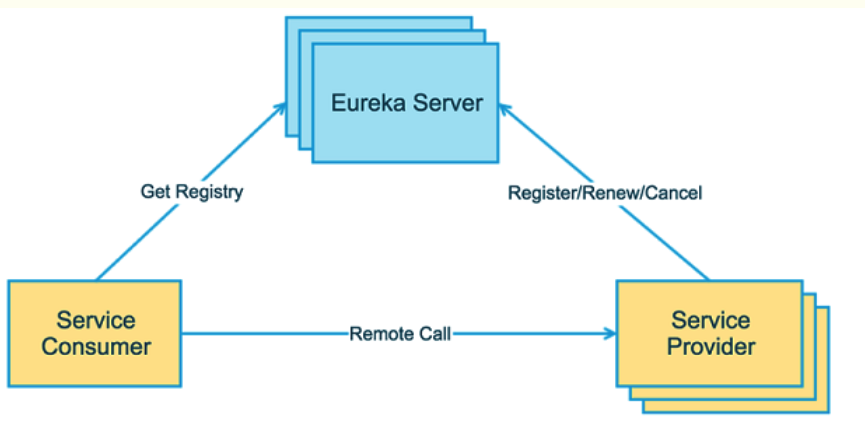
Eureka能實現服務自動的註冊和發現,在每次服務呼叫的時候根據服務名稱會獲取到目標服務的IP和埠,在進行呼叫。
如果服務下線或者上線,對應的服務的地址資訊也會進行更新,這樣就保證了,隨時可以呼叫到有效的服務。
同時為了提高效能,這個服務地址資訊會在每個服務本地快取一份地址資訊表,定時更新,這樣每次請求服務時,不用每次去Eureka查詢來降低服務呼叫耗時。
在本教學中,我們將學習如何使用SpringCloud Eureka進行服務註冊和發現,並通過OpenFeign進行服務的呼叫。
我們將做什麼
我們部署一個Eureka Server,並將我們的微服務(部門服務和使用者服務)作為 Eureka 使用者端,註冊到Eureka Server,同時使用使用者服務呼叫根據部門服務的Service ID 來呼叫部門服務相關介面。
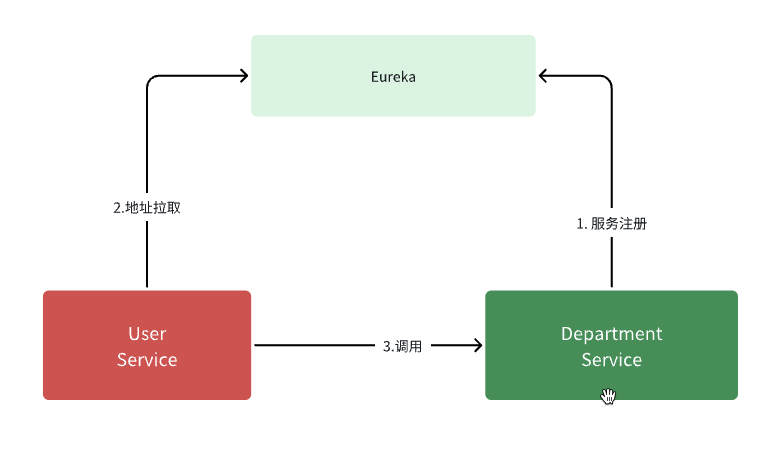
建立Eureka Server
1. 在 IntelliJ IDEA 中建立並設定 Spring boot 專案
讓我們使用 springinitializr建立一個 Spring boot 專案。
請參閱下面的螢幕截圖,在使用 springinitializr建立 Spring Boot 應用程式時輸入詳細資訊 :
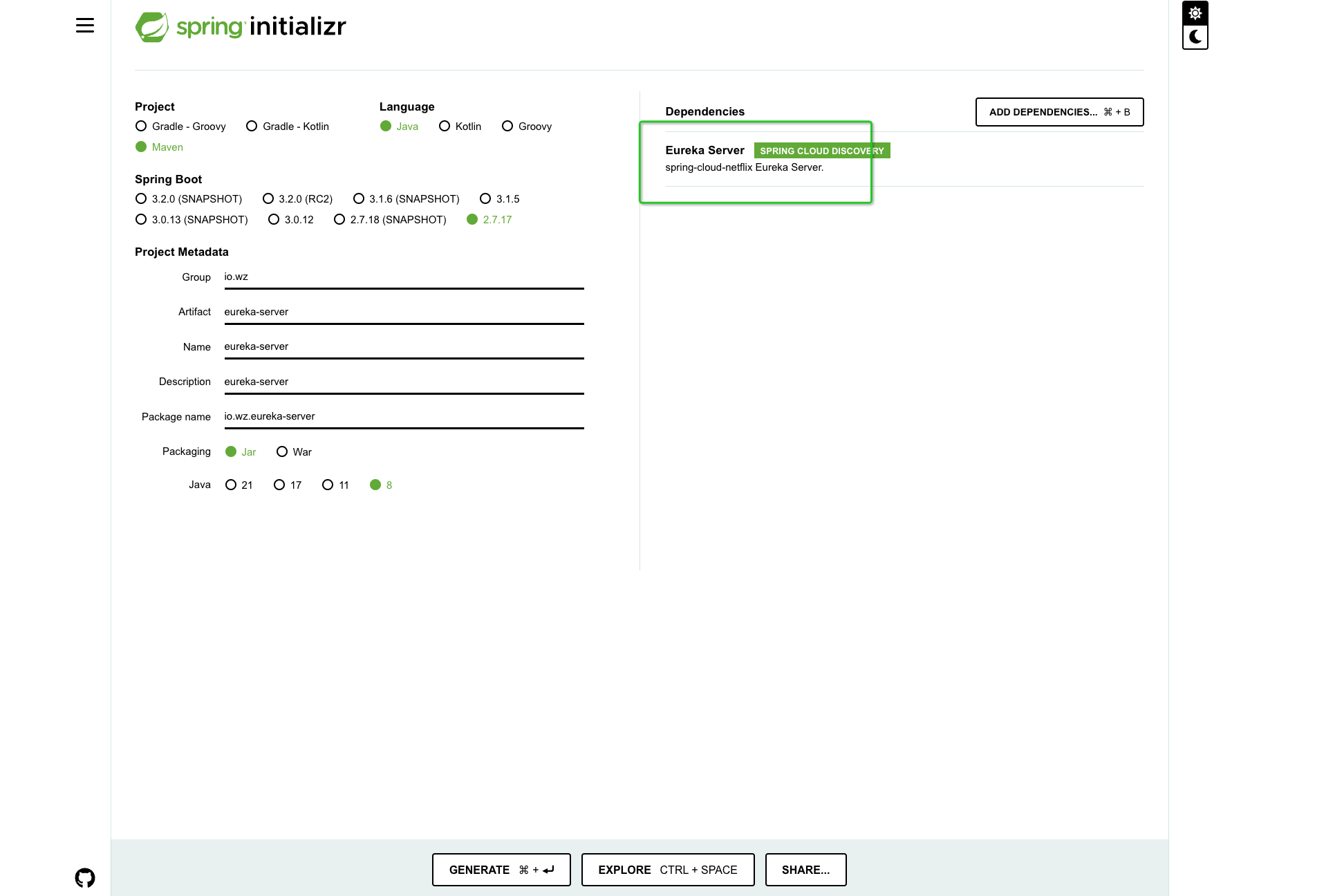
單擊生成按鈕以 zip 檔案形式下載 Spring boot 專案。解壓zip檔案並在IntelliJ IDEA中匯入Spring boot專案。
這是 pom.xml 檔案供參考:
<?xml version="1.0" encoding="UTF-8"?>
<project xmlns="http://maven.apache.org/POM/4.0.0" xmlns:xsi="http://www.w3.org/2001/XMLSchema-instance"
xsi:schemaLocation="http://maven.apache.org/POM/4.0.0 https://maven.apache.org/xsd/maven-4.0.0.xsd">
<modelVersion>4.0.0</modelVersion>
<parent>
<groupId>org.springframework.boot</groupId>
<artifactId>spring-boot-starter-parent</artifactId>
<version>2.7.17</version>
<relativePath/> <!-- lookup parent from repository -->
</parent>
<groupId>io.wz</groupId>
<artifactId>eureka-server</artifactId>
<version>0.0.1-SNAPSHOT</version>
<name>eureka-server</name>
<description>eureka-server</description>
<properties>
<java.version>1.8</java.version>
<spring-cloud.version>2021.0.8</spring-cloud.version>
</properties>
<dependencies>
<dependency>
<groupId>org.springframework.cloud</groupId>
<artifactId>spring-cloud-starter-netflix-eureka-server</artifactId>
</dependency>
<dependency>
<groupId>org.springframework.boot</groupId>
<artifactId>spring-boot-starter-test</artifactId>
<scope>test</scope>
</dependency>
</dependencies>
<dependencyManagement>
<dependencies>
<dependency>
<groupId>org.springframework.cloud</groupId>
<artifactId>spring-cloud-dependencies</artifactId>
<version>${spring-cloud.version}</version>
<type>pom</type>
<scope>import</scope>
</dependency>
</dependencies>
</dependencyManagement>
<build>
<plugins>
<plugin>
<groupId>org.springframework.boot</groupId>
<artifactId>spring-boot-maven-plugin</artifactId>
<configuration>
<image>
<builder>paketobuildpacks/builder-jammy-base:latest</builder>
</image>
</configuration>
</plugin>
</plugins>
</build>
</project>
2.新增@EnableEurekaServer註解
我們需要新增@EnableEurekaServer註解,使我們應用程式成為服務註冊中心。
package io.wz.eurekaserver;
import org.springframework.boot.SpringApplication;
import org.springframework.boot.autoconfigure.SpringBootApplication;
import org.springframework.cloud.netflix.eureka.server.EnableEurekaServer;
@SpringBootApplication
@EnableEurekaServer
public class EurekaServerApplication {
public static void main(String[] args) {
SpringApplication.run(EurekaServerApplication.class, args);
}
}
3. 禁用Eureka Server作為Eureka Client
預設情況下,每個Eureka Server 也是一個Eureka使用者端。由於我們只想讓他做好服務註冊中心,不想讓他做使用者端,因此我們將通過在application.properties檔案中設定以下屬性來禁用此使用者端行為。
spring.application.name=Eureka Server
server.port=8761
eureka.client.register-with-eureka=false
eureka.client.fetch-registry=false
4.啟動Eureka伺服器
Eureka Server 提供了 UI,我們可以在其中看到有關注冊服務的所有詳細資訊。
現在執行EurekaServerApplication並存取 http://localhost:8761,會顯示以下介面
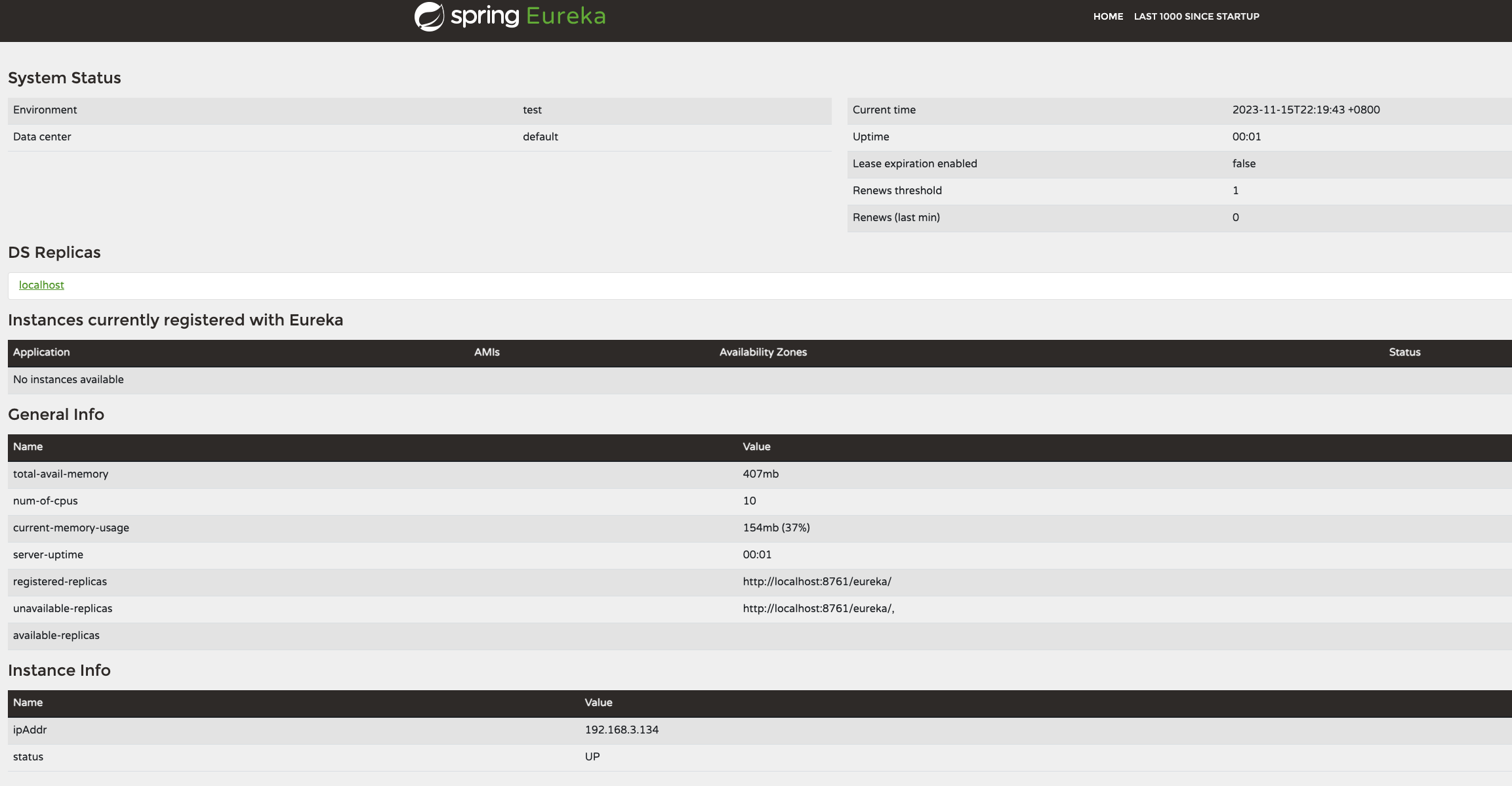
將Department-Service註冊至Eureka Server
請參閱本教學建立 部門服務 和 使用者服務 微服務: 使用 Spring Cloud Open Feign 的 Spring Boot 微服務通訊範例
讓我們將這個部門服務 作為 Eureka 使用者端並向 Eureka 伺服器註冊。
將 Eureka client pom新增到部門服務中:
<dependency>
<groupId>org.springframework.cloud</groupId>
<artifactId>spring-cloud-starter-netflix-eureka-client</artifactId>
</dependency>
另外,新增 Spring Cloud 依賴項:
<dependencyManagement>
<dependencies>
<dependency>
<groupId>org.springframework.cloud</groupId>
<artifactId>spring-cloud-dependencies</artifactId>
<version>${spring-cloud.version}</version>
<type>pom</type>
<scope>import</scope>
</dependency>
</dependencies>
</dependencyManagement>
新增版本屬性:
<properties>
<java.version>1.8</java.version>
<spring-cloud.version>2021.0.4</spring-cloud.version>
</properties>
在application.properties中設定eureka.client.service-url.defaultZone 屬性 即可自動註冊到 Eureka Server。
spring.application.name=DEPARTMENT-SERVICE
eureka.instance.client.serviceUrl.defaultZone=http://localhost:8761/eureka/
執行部門服務Eureka使用者端
完成此設定後,啟動Department-service並存取 http://localhost:8761。
看到部門服務已使用 SERVICE ID 註冊為 DEPARTMENT-SERVICE,注意到狀態為 UP(1),這意味著服務已啟動並正在執行,並且部門服務的一個範例正在執行。
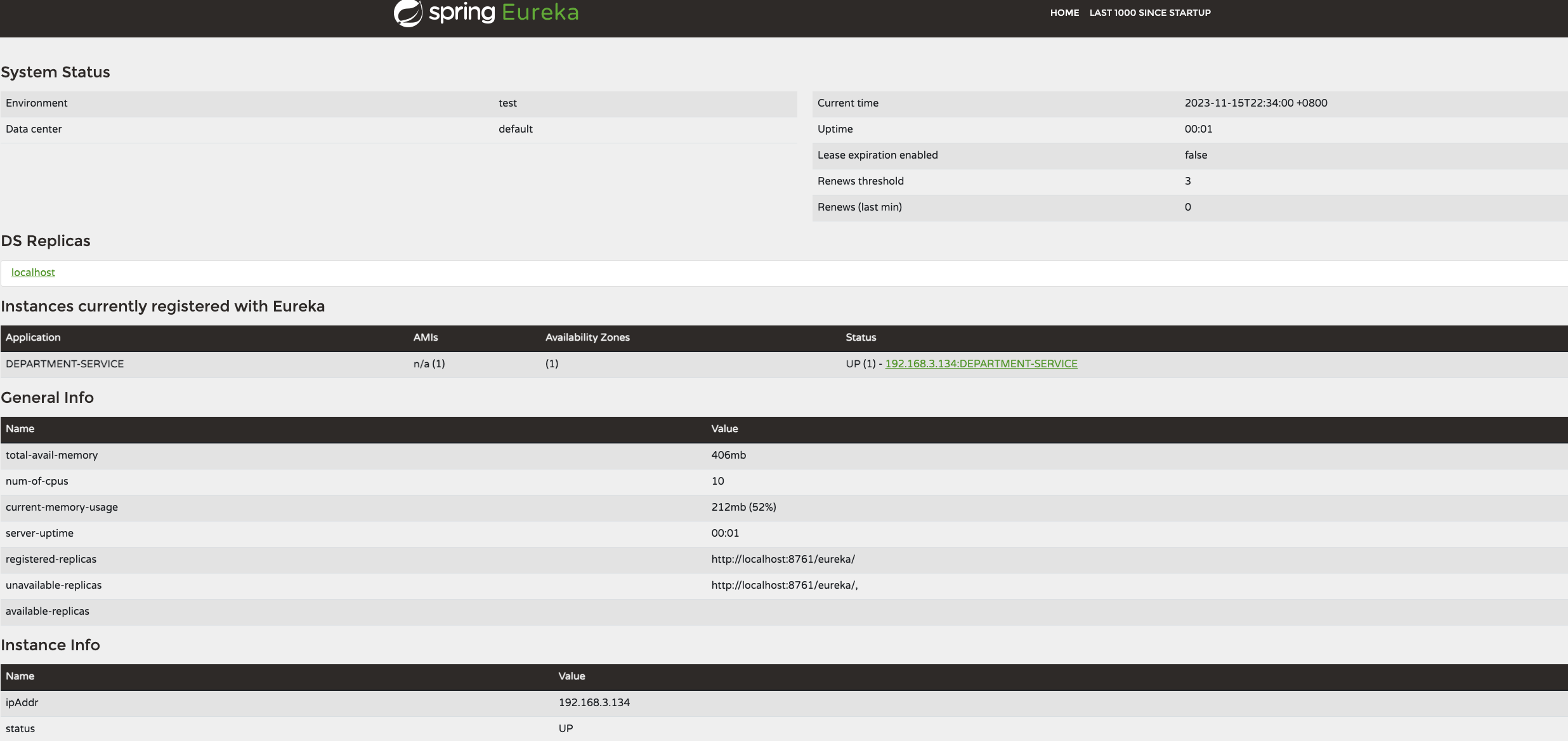
將User-Service微服務註冊為Eureka使用者端
新增以下依賴
<dependency>
<groupId>org.springframework.cloud</groupId>
<artifactId>spring-cloud-starter-netflix-eureka-client</artifactId>
</dependency>
在application.properties中設定eureka.client.service-url.defaultZone 屬性 即可自動註冊到 Eureka Server。
spring.application.name=USER-SERVICE
eureka.instance.client.serviceUrl.defaultZone=http://localhost:8761/eureka/
當服務註冊到 Eureka Server 時,它會在一定的時間間隔內不斷傳送心跳。如果 Eureka 伺服器沒有收到來自任何服務範例的心跳,它將假定該服務範例已關閉並將其從池中取出
修改user-service的ApiClient
在上一節中中,我們使用APIClient完成了進行服務呼叫,但是是寫了部門服務的url
@FeignClient(value = "DEPARTMENT-SERVICE", url = "http://localhost:8080")
這次我們修改如下,去除url屬性
@FeignClient(value = "DEPARTMENT-SERVICE")
完整api如下
package io.wz.userservice.service;
import io.wz.userservice.dto.DepartmentDto;
import org.springframework.cloud.openfeign.FeignClient;
import org.springframework.web.bind.annotation.GetMapping;
import org.springframework.web.bind.annotation.PathVariable;
@FeignClient(value = "DEPARTMENT-SERVICE")
public interface APIClient {
@GetMapping(value = "/api/departments/{id}")
DepartmentDto getDepartmentById(@PathVariable("id") String departmentId);
}
執行使用者服務Eureka使用者端
以上設定後,啟動 user-service 並存取http://localhost:8761。看到user-service已使用 SERVICE ID 註冊為USER-SERVICE。
您還可以注意到狀態為 UP(1),這意味著服務已啟動並正在執行,並且使用者服務的一個範例正在執行。
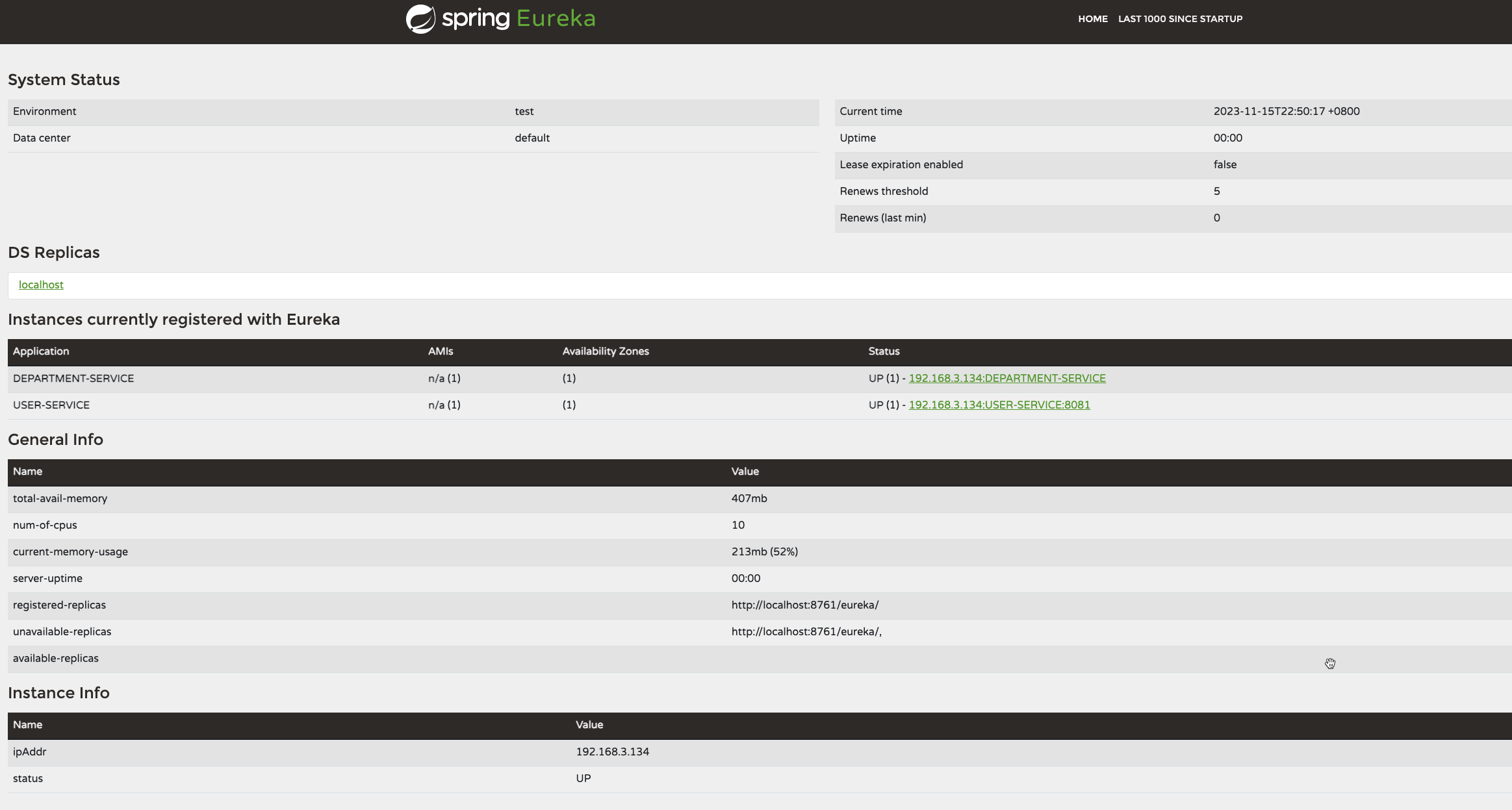
測試
增加測試紀錄檔
在部門服務的DepartmentServiceImpl的getDepartmentById方法增加偵錯紀錄檔,如果呼叫到此介面,會列印getDepartment By Id
@Override
public Department getDepartmentById(Long departmentId) {
log.info("getDepartment By Id:{} ",departmentId);
return departmentRepository.findById(departmentId).get();
}
啟動2個Department-Service
1. 啟動一個8082的部門服務
在idea中複製DepartmentServiceApplication設定,同時在啟動引數指定應用埠 -Dserver.port=8082
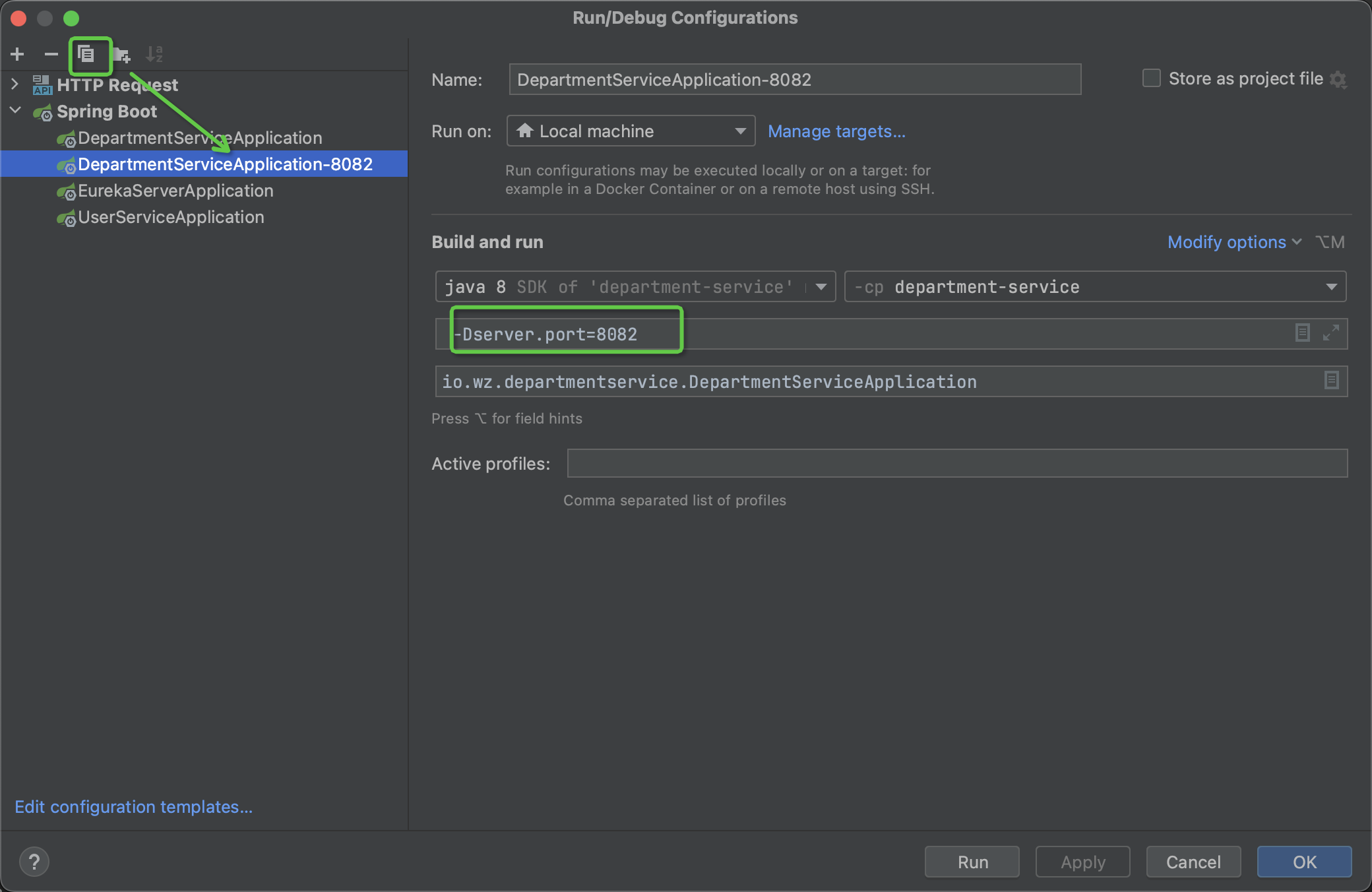
2. 啟動預設的部門服務,埠為8080
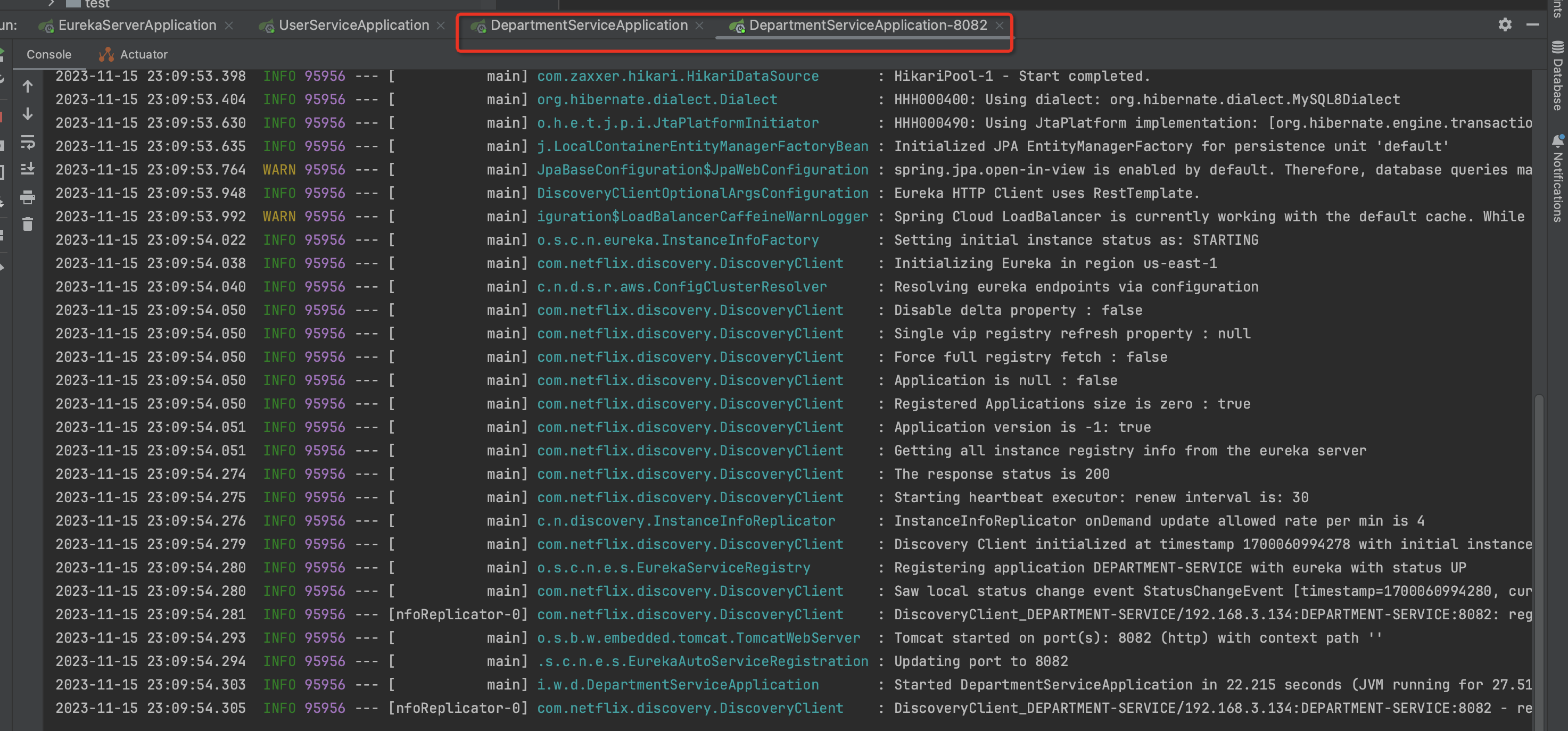
以上2個部門服務啟動完成,會在eureka看到2個部門服務
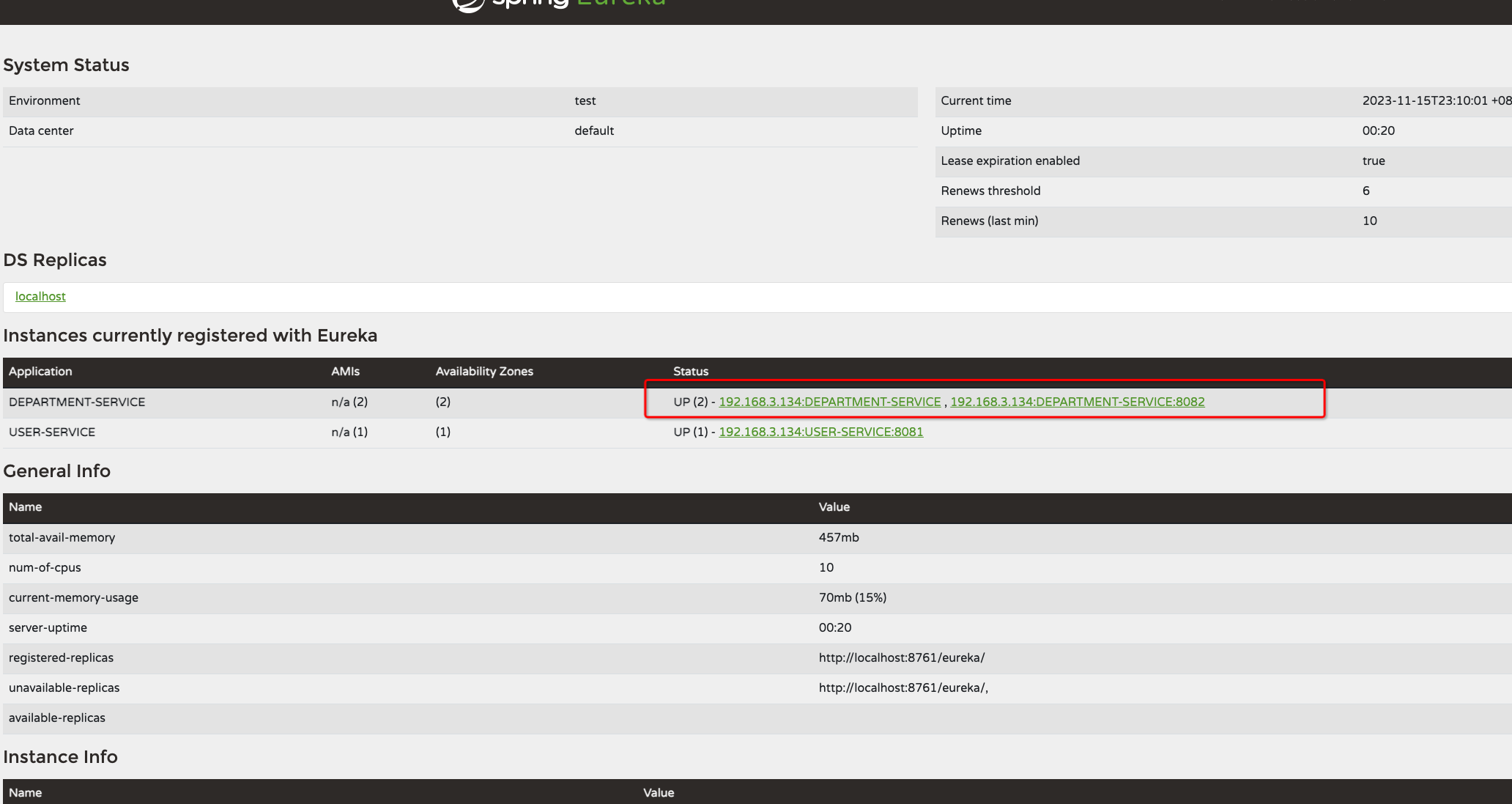
點選獲取使用者 REST API進行測試
多點選幾次,會看到2個部門服務控制檯都會列印,getDepartment By Id:1,這裡使用的是Spring Cloud LoadBalancer提供的輪訓演演算法
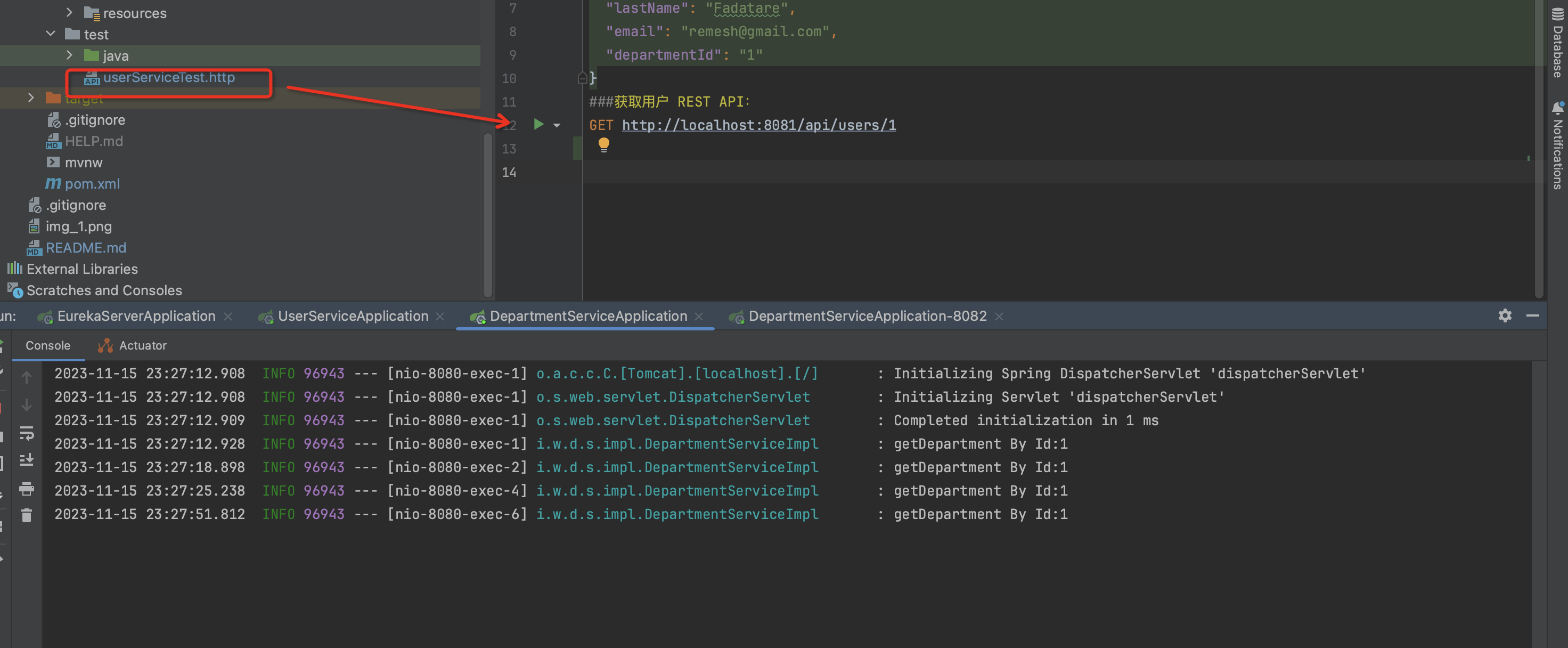
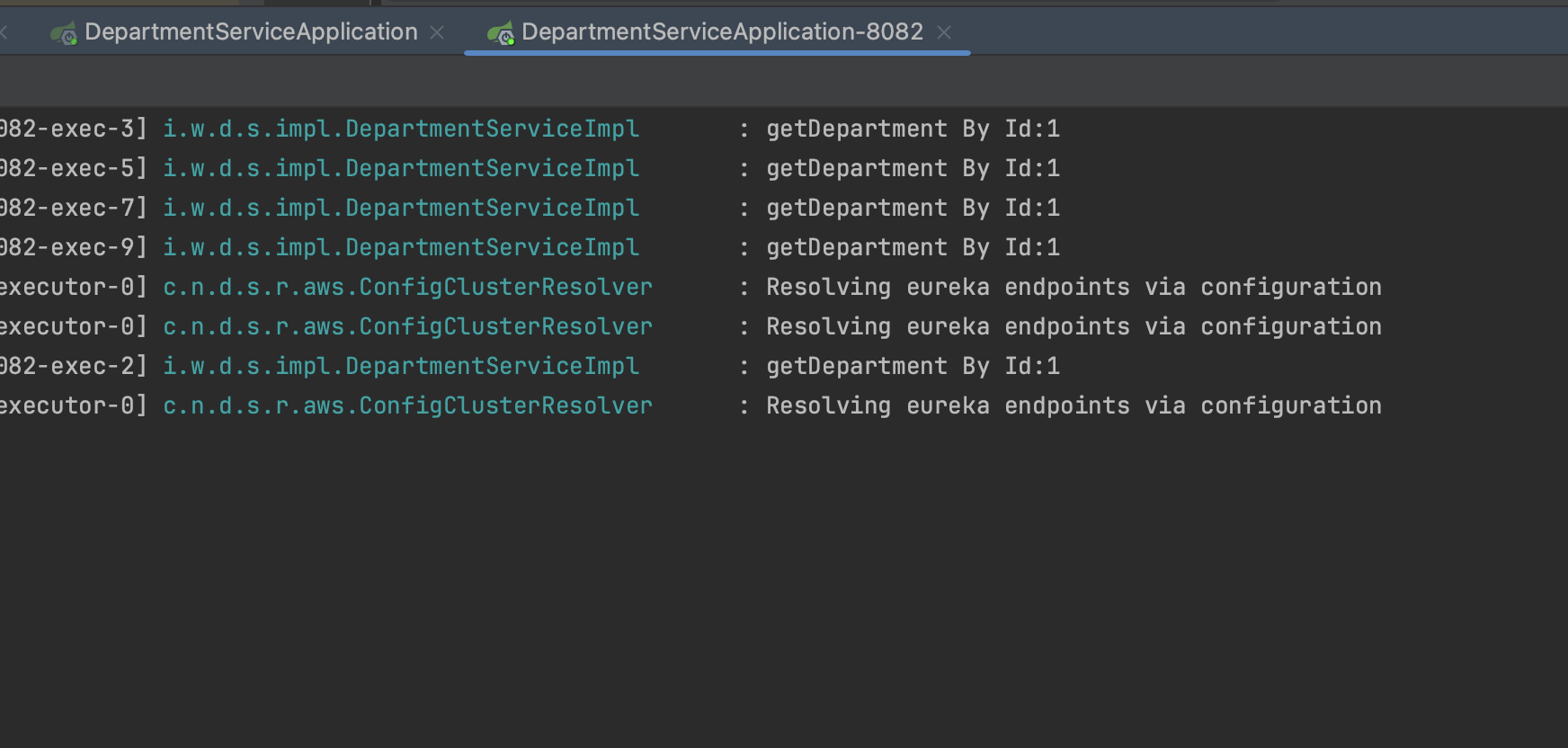
結論
在本教學中,我們學習瞭如何在 Spring boot 微服務專案中使用Eureka來進行服務的註冊與發現,同時基於Feign進行服務的呼叫,但是這裡還有遺留問題,如
- 啟動服務以後需要多久才會被消費方查詢到地址?
- 如果要做服務更新,如何讓消費無感知,感受不到服務再重啟?
- 如何讓呼叫方知道呼叫的是提供方多個範例中具體哪一個服務範例?
以上問題後續文章解答,請關注此公眾號。